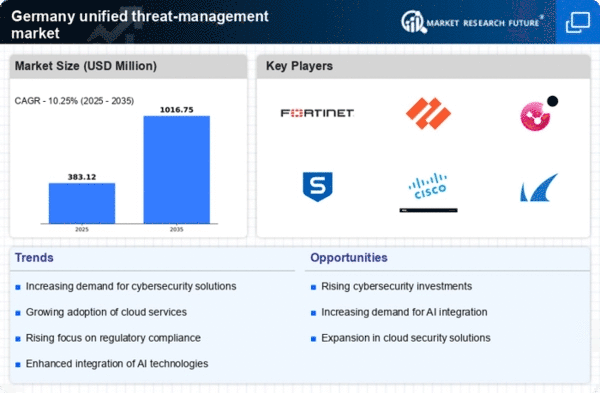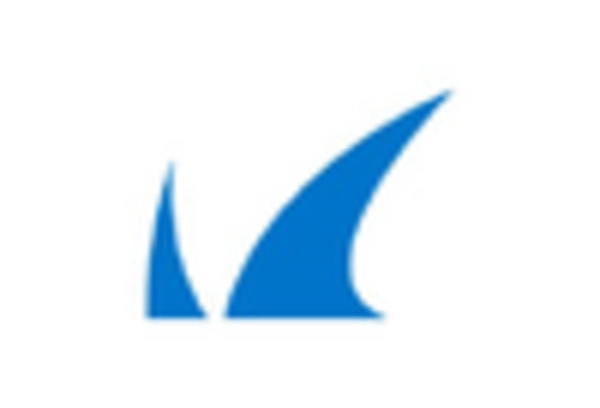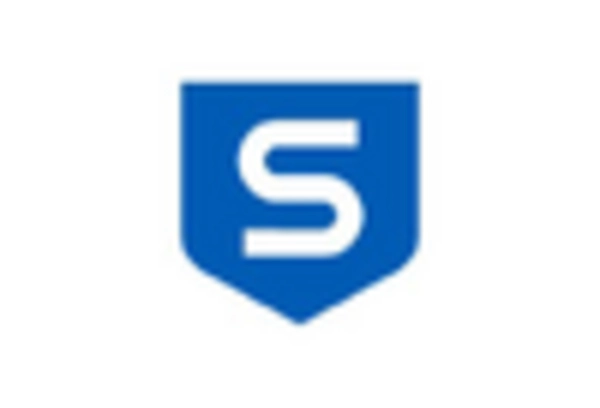Rising Cybersecurity Threats
The increasing frequency and sophistication of cyber threats in Germany is a primary driver for the unified threat-management market. Organizations are facing a surge in ransomware attacks, phishing schemes, and data breaches, which necessitate robust security solutions. In 2025, it is estimated that cybercrime could cost the global economy over $10 trillion annually, with a significant portion of this impact felt in Germany. As businesses strive to protect sensitive information and maintain operational integrity, the demand for comprehensive security solutions, such as unified threat-management systems, is likely to rise. This trend indicates a growing recognition of the need for integrated security measures that can address multiple threat vectors simultaneously, thereby enhancing overall cybersecurity posture.
Increased Adoption of Remote Work
The shift towards remote work in Germany has created new challenges for cybersecurity, driving demand for unified threat-management solutions. As employees access corporate networks from various locations, the attack surface expands, making organizations more vulnerable to cyber threats. In 2025, it is projected that remote work will account for approximately 30% of the workforce in Germany, necessitating enhanced security measures. Unified threat-management systems offer a centralized approach to security, enabling organizations to monitor and protect remote endpoints effectively. This trend suggests that businesses are increasingly recognizing the importance of securing remote access and ensuring that their cybersecurity strategies are adaptable to evolving work environments.
Regulatory Compliance Requirements
Germany's stringent regulatory environment, particularly concerning data protection and privacy, is a significant driver for the unified threat-management market. The General Data Protection Regulation (GDPR) imposes strict requirements on organizations to safeguard personal data, with potential fines reaching up to €20 million or 4% of global turnover. As companies navigate these complex regulations, they increasingly turn to unified threat-management solutions to ensure compliance and mitigate risks associated with data breaches. The market is expected to grow as organizations seek to implement comprehensive security frameworks that not only protect data but also demonstrate compliance with regulatory standards. This trend highlights the critical role of unified threat-management systems in facilitating adherence to legal obligations while maintaining customer trust.
Growing Awareness of Cybersecurity Risks
There is a notable increase in awareness regarding cybersecurity risks among businesses in Germany, which is significantly influencing the unified threat-management market. As high-profile data breaches and cyber incidents make headlines, organizations are becoming more proactive in addressing their security needs. Surveys indicate that over 70% of German companies consider cybersecurity a top priority, leading to increased investments in security infrastructure. This heightened awareness is likely to drive the adoption of unified threat-management solutions, as organizations seek comprehensive systems that can provide visibility and control over their security posture. The trend suggests a shift towards a more security-conscious culture within organizations, further propelling the growth of the unified threat-management market.
Technological Advancements in Security Solutions
Rapid advancements in technology are reshaping the unified threat-management market in Germany. Innovations in artificial intelligence, machine learning, and automation are enhancing the capabilities of security solutions, allowing for more proactive threat detection and response. As organizations seek to leverage these technologies, the demand for unified threat-management systems that integrate advanced features is likely to increase. In 2025, the market for AI-driven security solutions is expected to grow by over 25%, reflecting a broader trend towards intelligent security frameworks. This evolution indicates that businesses are prioritizing solutions that not only address current threats but also adapt to future challenges, thereby driving growth in the unified threat-management market.
















